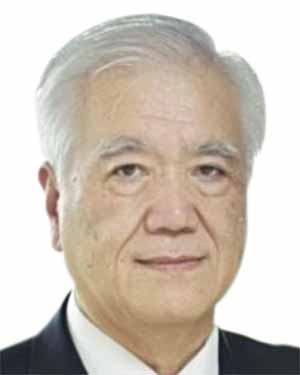11:00 JST, March 28, 2025
When one large group of people and many small groups live together in a certain place, this situation can be metaphorically referred to as the “Snow White and the Seven Dwarfs” phenomenon. The political situation that has prevailed in Japan since around the late 1990s fits this definition pretty closely.
In those days, there were occasions when some “dwarfs” joined forces to forge large political groups. In 2009, the Democratic Party of Japan, which was established by multiple opposition parties, took power from the then ruling coalition of the Liberal Democratic Party and New Komeito Party (now Komeito). However, the DPJ lost power just three years later, splitting into multiple small political groups as in the past.
The tense rivalry between political parties has faded and this caused the political environment to deteriorate further. “Snow White” kept consolidating what was called “one-strong” rule to the extent that it eventually became mired in a haze of allegations surrounding political factions and their fundraising activities. It seems that the haze has turned to “black mist,” a term referring to corruption involving politicians.
On the other hand, some of the “dwarfs” grew larger in last year’s House of Representatives election. They can now forge a majority in the lower house if they join together. However, they are carrying on the bad habit of sporadically adopting “ad hoc alliances of convenience,” resulting in a lack of lasting cohesion.
In 2024, which was dubbed the year of elections, over 1 billion people voted around the globe. Almost all of the ruling parties or governments in power consequently suffered election defeats. The few exceptions included Taiwan’s ruling party candidate, who won the presidential election while his party lost in the legislative polls, and India’s governing coalition, which barely secured a legislative majority while logging a sharp decrease in its number of parliamentary seats.
All the election results in 2024 appear to have demonstrated voters’ desire to reject the then governing parties in their countries, rather than their appreciation of the opposition parties’ policies. This general trend is likely to be repeated in the next elections and beyond. As a result it will undoubtedly be more and more difficult to have a stable government in many countries and regions.
Many countries are faced with an array of issues, including inflation, poverty, income inequality, increasing migration pressure, deteriorating educational conditions, human rights failures, and delays in implementing measures to sustain the environment. People are increasingly frustrated that the existing governments in their countries have not been doing enough to overcome these problems.
Excessive liquidity, a situation in which too much money is available, is exacerbating income and wealth inequalities. It has become clear that the morbidity and mortality rates of the coronavirus pandemic tended to rise depending on people’s income levels, so people have been saying the existing governments do not listen to their voices and they can’t stand it any longer.
Voters’ pent-up discontent
This kind of pent-up discontent led to Donald Trump’s reelection to the U.S. presidency.
In the first place, the two-party system may be out of sync with the times. Nowadays, it is obvious that the quintessential two-party system is still working only in the United States. In the United Kingdom, the Conservative Party, the Labour Party, the Liberal Democrats and the Scottish National Party, among others, have been at odds in Parliament for the past 20 years. Likewise, many other parts of the world have a number of political parties with multiparty governments at the helm.
The era in which public opinion was divided into right and left over a one-dimensional straight line is over. Now, political parties jockey for position in two-dimensional quadrants, or within even more dimensions, to represent the voices of as many voters as possible.
We have likely ushered in an era in which two or three relatively large parties coexist with numerous small parties.
In such a political landscape, some small parties focusing just on one single issue or another have succeeded in winning a certain level of voter support. Even though each of them insists that they are not populist, collective moves by small parties have given rise to populist politics.
In my view, Japan’s single-seat constituency system is first and foremost not compatible with the current situation, due partly to the abundance of wasted votes. For that reason, it seems inevitable that there should be a reexamination of the House of Councillors election system, which includes many electoral districts that effectively amount to single-seat representation.
Today, the biggest challenge facing the Japanese political system is not region-to-region disparities but generational inequality. In foreign countries, too, voters’ dissatisfaction and frustration with politics are not a regional issue but a national phenomenon. A system that enables people’s voices to be duly heeded should be worked out, without being bound by what was successful in the past.
I respect Prime Minister Shigeru Ishiba’s regional revitalization policy. That said, I’m afraid that he appears to be moving regional economies toward a diminishing equilibrium, without dealing with the need to enlarge the economic pie as a whole. His initiative seems to be biased toward the sentiment that “things were better in the old days. Let’s go back to that time.”
I also have respect for the view that the voices of these depopulated areas should be protected rather than ignored. But the reality is that “regional representation” in the Diet is already sufficiently ensured because of the presence of representatives elected from single-seat constituencies and those elected from proportional representation blocs after running only for the blocs in the lower house.
We actually have excessive regional representation because of the foolish system of allowing candidates who lost in single-seat constituencies to win in proportional representation blocs, as they are allowed to run in both in the same election.
Generational disparity, discord
There is no question that regional representation is important. Still, it is a serious problem that while the roles of the lower and upper houses are little different, they both remain fixated on the issue of vote-value disparities for urban and rural voters.
Generational disparities and rivalry have become a real issue, especially with regard to the country’s pension scheme, government debt redemption and the changing structure of the labor force. To cope better with these challenges, the House of Councillors election system should be transformed from geographical representation to generational representation to enable the voices of each generation to be adequately heeded.
I think the upper chamber of the Diet should be reformed to reduce the number of members from 248 at present to 100, serving terms of five years each instead of the current six. They should be eligible for reelection, and the entire house should be up for grabs at the same time, abolishing the current system of electing half of its members every three years. While the lower house could be dissolved by the prime minister, such a measure should not be introduced for the upper house.
My proposal envisages the abolition of the geographical constituency system. The electorate, consisting of all eligible voters residing in Japan and abroad, should vote in a single constituency, which should be divided into generation-based subsections. To be specific, there should be seven subsections, comprising the age groups of 18-30 years old, 31-40 years old, 41-50 years old, 51-60 years old, 61-70 years old, 71-80 years old and 81 years old and beyond. Wherever they live, each person will vote in the generational subsection they belong to. The exact number of seats allocated to each subsection should be determined based on demographic data from the latest national census.
It is conceivable that the number of votes obtained by a successful candidate in a subsection with a low voter turnout will be below that for an unsuccessful candidate in another subsection. If the gap becomes too big, one possible solution may be the introduction of a rule to adjust the number of seats allocated to each subsection in each election by taking into account the preceding poll’s voter turnout rates and the aggregate of ballots cast.
A voter would cast a single vote for a candidate, while candidates would choose their political party affiliation at their discretion. Anyone aged 18 and beyond would be qualified to declare their candidacy in any generation-based subsection, regardless of their actual age. Multiple candidacies would be forbidden, and there would be no minimum vote requirement for candidates to be elected to the upper house.
I strongly hope for an early start of discussions on reforming the House of Councillors election system with a comparative examination of a variety of proposals, including mine and one that may focus on enhancing regional representation, for example. Depending on the prevailing circumstances, it may become necessary to establish an organization — outside the Diet — that would have decision-making authority over the reform of the House of Councillors election system.
These changes in the election system may bring distortions in voting patterns through the use — and abuse — of social media. This phenomenon has already occurred in recent elections. The two houses of the Diet should immediately tackle this issue, which affects them both.
The main purpose of my proposal is to implement a system to better reflect differing voices between generations in politics. The other key point is the prevention of the hereditary succession of Diet seats from incumbent lawmakers to their children. I do not entirely dismiss the view that hereditary succession is meaningful in that it helps second generation people engage in political activities from an early age and cultivate a political perspective that takes in the big picture.
Even so, it makes little sense if second generation people say they cannot demonstrate their capabilities as politicians when they have to run in constituencies outside their parents’ regional electoral districts. If this is the case, their qualities as lawmakers will be questioned. Rather, it should be more beneficial for would-be politicians to be elected to the Diet from a nationwide constituency.

Hiroshi Watanabe
Watanabe is president of the Tokyo-based Institute for International Monetary Affairs. Previously, he served as vice finance minister for international affairs, and governor and chief executive officer of the Japan Bank for International Cooperation.
The original article in Japanese appeared in the March 23 issue of The Yomiuri Shimbun.
Top Articles in Editorial & Columns
-

Riku-Ryu Pair Wins Gold Medal: Their Strong Bond Leads to Major Comeback Victory
-

40 Million Foreign Visitors to Japan: Urgent Measures Should Be Implemented to Tackle Overtourism
-

China Provoked Takaichi into Risky Move of Dissolving House of Representatives, But It’s a Gamble She Just Might Win
-

University of Tokyo Professor Arrested: Serious Lack of Ethical Sense, Failure of Institutional Governance
-

Policy Measures on Foreign Nationals: How Should Stricter Regulations and Coexistence Be Balanced?
JN ACCESS RANKING
-

Japan PM Takaichi’s Cabinet Resigns en Masse
-

Japan Institute to Use Domestic Commercial Optical Lattice Clock to Set Japan Standard Time
-

Israeli Ambassador to Japan Speaks about Japan’s Role in the Reconstruction of Gaza
-

Man Infected with Measles Reportedly Dined at Restaurant in Tokyo Station
-

Videos Plagiarized, Reposted with False Subtitles Claiming ‘Ryukyu Belongs to China’; Anti-China False Information Also Posted in Japan
























